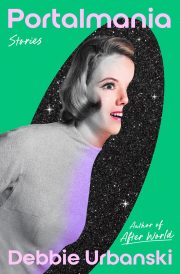An Interview with Norman Spinrad, Anarchist
by Cat Rambo
 American science fiction writer Norman Spinrad described himself as an anarchist and a “syndicalist” in a 1999 interview with Locus. His work challenges and provokes, whether it’s The Iron Dream starring Hitler as a speculative writer or the more recent Osama the Gun. He’s just as outspoken when answering questions, as this interview proves.
American science fiction writer Norman Spinrad described himself as an anarchist and a “syndicalist” in a 1999 interview with Locus. His work challenges and provokes, whether it’s The Iron Dream starring Hitler as a speculative writer or the more recent Osama the Gun. He’s just as outspoken when answering questions, as this interview proves.
Q: The Iron Dream, an alternate history novel about a writer named Adolf Hitler, was banned for eight years in Germany. What drew you to that story and why did you describe the writing of it as “unpleasant”?
NS: Try reading everything Hitler ever wrote for the purpose of being able to channel him and write in his turgid style and see how you like it! I didn’t really know what I was into until I was into it. By the time I finished the novel, I hated it. Only over a few years of awards, world-wide publication, good to rave reviews, did I realize it was the process of writing The Iron Dream that I hated, not the novel itself.
What drew me to write it was that the economic and political reasons for the rise of Nazi Germany never convinced me. Hitler was a media genius, and Nazism a psychosexual phenomenon. … Like a certain species of “heroic fantasy.” Hitler was a big fan of Wagnerian Opera at a time when “Space Opera” had a big fandom too. “Homer Whipple’s” afterward sort of tells the tale, and was the only part of the novel I really enjoyed writing.
Q: Osama the Gun is an experiment in e-publishing and also a book you describe as “literarily and politically important.” Is the impulse behind that book similar to the one behind The Iron Dream? What makes it politically important?
NS: Osama the Gun is indeed literarily and politically important, but not like The Iron Dream, where the importance is literarily and politically historical. Osama the Gun is currently politically, socially, psychologically and spiritually important, for the same reasons that it has been rejected by so many American publishers, which The Iron Dream never was, why one rejection letter, foaming at the mouth, declared that no American publisher would touch it.
The Iron Dream certainly would not lead anyone to be sympathetic to Hitler or the Nazis, but Osama the Gun, among other things, is designed as a kind of “Sympathy for the Devil,” the current devil for so many Americans, Islam, just as the United States is the current “Great Satan” for much of the Islamic Umma. To put the reader inside the consciousness of a sincere Muslim kid who is stepwise seduced into become an Islamic terrorist and a jihadhi icon, while remaining sympathetic in a personal manner though delusional in a political manner. A novel that distinguishes between Islam the religion and Islamic terrorism through “Method Writing” in first person in the voice of a personally sympathetic Islamic terrorist, a tragic figure in the end.
Hate the sin, love the sinner. Precisely because the current American culture is so unprepared and unwilling to ponder that no American publisher has had the courage to publish Osama the Gun is why Americans need to read something like this. And why I wrote it on spec knowing getting it published in the United States was going to be a terrible struggle and maybe a losing one. Although the US doesn’t exactly come off as entirely heroic in the novel, I felt, and still feel, that on a higher level, writing it, that trying, was a patriotic duty.
Q: Has Osama the Gun been successful sales-wise? What Internet mechanisms have you used to publicize it? Will you try this experiment again?
NS: Thus far Osama the Gun as an ebook original has not been successful saleswise, it is, after all, an experiment, and I committed only to leaving it on Amazon and Barnes and Noble through October. And one thing the experiment has taught me is how in hell can you get a novel reviewed that doesn’t exist in galleys or paper book form? And how can you sell it without reviews? Internet PR–Facebook, website, blog, etc.–doesn’t really reach a potential mass audience, and the so-called reviews on Amazon or most websites do not have much professional critical credence. And even if they did, who reads them?
An experiment in progress. Which so far is teaching me that maybe having a major publisher pay 25% royalties might not be so unreasonable for an original launch if there was a simultaneous hardcover or trade paperback, galleys, professional pr, and so forth. Thus far I’ve learned that while direct publishing and 70% royalties may be salvation for backlist titles, it’s a lot harder to do it yourself for an original, and taking lower royalties of 25% from a publisher really doing its job might make sense.
Which is why I only committed to an ebook alone for 90 days as an experiment. And maybe to get a publisher to screw up the courage to do Osama the Gun in paper-and-ink edition while being able to bring it out as its own ebook later and collect 75% royalties.
I’m willing to listen to offers on this basis. I don’t think I want to have to try this experiment again with Welcome To Your Dreamtime and/or Police State, both of which have been sold to my French publisher, Fayard, the former as a finished novel, the latter on a complete treatment and a work in progress, common in the US, but virtually unknown in France.
Q: Moussa in Child of Fortune becomes a Ruespieler, a storyteller, and you’ve mentioned that you see the book as an autobiographical novel. What do you see as the social role of the storyteller? What are the best things about being a storyteller?
NS: Well, I don’t remember calling Child of Fortune an autobiographical novel in the personal sense, but I suppose it can be regarded as such in a general sense, that is, for writers in general with a serious literary ambition, a social role, as you say. As I say in the title song of another novel, Little Heroes, “in the story of ourselves, we all are heroes.” Or aspire to be. Or at least try to be. And the social role of the storyteller is to tell stories that feed and support such aspirations in the reader one way or another.
And that social role, the aspiration to fulfill it, what writers feel when they feel they have, is the best thing about being a storyteller, doing well by doing good, living your life by doing what you love, and, of course, if it goes well enough, the freedom of being your own boss and not having to work a 9-to-5er.
Q: Bug Jack Barron was a cyberpunk tale (created before the term cyberpunk) that got you denounced by the British House of Commons and led to New Worlds, which had published the shorter version, getting banned. What didn’t they like about the novel? What do you think are the controversial stories of today?
NS: Actually, New Worlds published the whole novel in 6 installments, not a shorter version, and it was that serialization which got me denounced in Parliament. The novel was never officially banned in Britain as such, Parliament didn’t have that power. W.H. Smith refused to distribute New Worlds with a middle installment of Bug Jack Barron in it, and the British Arts Council, a government organ which modestly subsidized the magazine, put public pressure on W.H. Smith to rescind the ban, and it worked. And that was what caused “questions” in Parliament, denunciations of the Arts Council, New Worlds, and myself.
What didn’t they like? Supposedly the explicit sex and the “dirty words.” Seems archaic now, the explicit sex was straightforwardly heterosexual and there for story points, and the “Carlin” words are now everywhere except on broadcast television. But Bug Jack Barron smashed what were then taboos in science fiction and did it in a novel that was forthrightly, specifically, revolutionarily political, and I think those were the real reasons.
Q: What are “controversial stories” in the same sense today?
NS: Nothing. That battle was won, once and for all, at least in terms of sex, drugs, dirty words, and rock and roll. Politically? See the above discussion of Osama the Gun.
Q: You’ve embraced social networking, including making your own YouTube videos, blogging, and maintaining a presence on Facebook and Twitter. Why? Have there been any places where it’s been especially successful for you? Any disasters?
NS: Well I seem to have always been ahead of the online curve, having invented the Internet in the 1970s with A World Between, long before Al Gore, before there was even such a thing as a word processor, an early self-created website with primitive software, etc. I got into YouTube with a 2 parter about Star Trek because I had stories to tell that way to that audience, went on from there, to a 5 part Osama the Gun video series, partly to try to get the book sold, partly a history of political Islam and its current geopolitics, then all sorts of videos for the fun of it, music video, reportage, bibliography, whatever. From there into blogging, and Facebook.
I’ve always been a multimedia guy to the side of the main thing, text fiction. TV and feature film screenplays. A talk radio show. Sculpture, painting, photography, song writing and performing. If I hadn’t become a novelist early on, I’d probably be a hopeless dilettante.
No disasters, no huge successes. Some good pr. Maybe a bit of political good deeds. I do this stuff for its own sake, mostly. I’ve always been a good eclectic cook, a chef even once told me I could make it in his game. Four decades ago, when I first met Dona Sadock, one thing she said to me was “Ah, a Renaissance Man.” Why not? As long as you have something on which you’re centered.
Q: What is Welcome to Your Dreamtime about? What were the challenges of making the reader the viewpoint character?
NS: I’ve always been interested in dreams, in the dreamtime, what are they, what is it? The Dreamtime, after all, is both real and fantasy. We all experience it, in that sense it is definitely “real.” But the dreams we experience are “fantasies.” And at least in my experience, stories, the essential creative kernel, come from the same “place” that is not a place. Call it the collective unconscious, call it the individual unconscious, call it the realm of the Atman, call it what you will, I believe that the dream state and the creative state are functionally the same thing.
And particularly what is called “lucid dreaming” in which you’re dreaming but know you’re dreaming. And beyond even that, at least for me, when you can create what happens in your dreamtime yourself.
So that’s what led me to write Welcome To Your Dreamtime. The McGuffin, the science fiction of it, is a device which allows you to put a net on your head and a “dreamchip” in a player and experience a dream created for you by a dreamwriter.
That’s level one. It starts that way, as commercial schlock, evolves into an art form, becomes downloadable, gets infected by evil viruses, and finally … well … if it works on the ultimate level, finally the reader is left with the transliterary gift of learning to not only dream lucidly but enter the Dreamtime in the stage beyond even that, to become the crown of your own Dreamtime creation.
Well to do all that, the body of the novel has to be a series of dreams, and the dreamer, the viewpoint character, has to be you the reader, and the only way to write those dreams therefore is in second person singular. Each individual reader is the viewpoint character in order to duplicate the dreamtime artform as direct experience.
That was the challenge. More than one editor who I respected told me I was out of my mind. An entire novel written in second person? No delineated viewpoint character at all? The whole told from the viewpoint of the person reading it? Impossible!
Well, I had never read anything like what I wanted to write or heard of anything like it either, I knew the chances of getting a contract to write such a novel were pretty slim, and even if I did, I myself wasn’t so sure I myself could fulfill it . So what I decided to do was write the frame for myself but show it to no one, then try to write the individual dreams one by one over several years while I was doing other things, and see if I could sell them as free-standing short stories, for the most part without even telling editors they were anything else.
And that’s what I did. And it worked. I sold six of these stories to one original anthology and five magazines. And only then did I rewrite them into the novel and write a long final segment entirely for the book. I tried to sell it to an American publisher when it was completed, but didn’t get very far before my French publisher, Fayard, bought it. It’s been translated but not yet published in France, and Fayard, which bought world rights, is not yet trying hard to market the English language rights because they want to publish first. But that’s next fall, and even if a US or British publisher bought the rights today, publishing rhythms being what they are, Fayard would still get to publish first.
So that’s the current story of Welcome to Your Dreamtime, admittedly the most experimental novel I’ve ever written.
Q: Where do you think the perennial debate between what is literary fiction and what is genre is sited?
NS: I think it’s a load of crap. See my latest column in Asimov’s, particularly re The Road by Cormac McCarthy. I detest the whole concept of genre. A piece of fiction is either a good story well told or it isn’t. The supposed dichotomy between “literary fiction” and “popular fiction” is ridiculous. Hemingway, Fitzgerald, Mailer, did not have serious literary intent? As writers of serious literary intent, they didn’t want to be “popular,” meaning sell a lot of books? They wanted to be unpopular and have terrible sales figures to prove they were “serious”?
I say this is bullshit and I say the hell with it. “Genre,” if it means anything at all, is a restrictive commercial requirement. “Westerns” must be set in the Old West. “Mysteries” must have a detective solving a crime, usually murder. “Nurse Novels” must have a nurse. And so forth.
In the strictly literary sense, neither science fiction nor fantasy are “genres.” They are anti-genres. They can be set anywhere and anywhen except in the mimetic here and now or a real historical period. They are the liberation of fiction from the constraints of “genre” in an absolute literary sense.
In a commercial schlockmeister sense, of course, it’s another matter, unfortunately there’s a deluge of SF in the extended sense of various kinds written to commercial schlock formats, literary television, as witness the mass market invasion of vampires, zombies, werewolves, and the living dead in all fictional media.
But don’t get me started about what constitutes “a good story well told!” I’ve been writing about that for something like three decades or so, and fortunately it’s still built atop the mystical subconscious.
Q: What are you reading lately that’s got you looking for more by the author?
NS: The Dervish House by Ian McDonald. Embassytown and The City & the City by China Mieville. The Windup Girl by Paolo Bacigalupi. Supersad True Love Story by Gary Shteyngart. But hey, I review SF for Asimov’s, look there for my most recent and not so recent fave raves.
Q: What book of yours would you recommend to a first-time reader?
NS: Hard to say, because it depends on the tastes of the reader in question. I think He Walked Among Us is my very best, or among my very best at least, and quite accessible to the general reader who has never read SF. Child of Fortune and The Void Captain’s Tale I think are on the highest literary and stylistic level I’ve so far achieved, but may require some familiarity with science fiction . If you’re into rock and roll, by all means Little Heroes. You pays your money and you takes your choice.
Of course, short story collections give one a wider intro to the full oeuvre of any writer — The Last Hurrah of the Golden Horde, No Direction Home, New Worlds Coming, The Star-Spangled Future, Other Americas.
Q: You served as President of SFWA from 1980-1982 and also from 2001-2002. What do you see SFWA’s role for writers becoming or continuing to be over the next decade? How has the organization changed in the last thirty years?
NS: What SFWA’s mission over the coming decade should be is first and foremost a quasi-union, that is, as close to a union as a writers’ organization can be, representing the economic interests of its members with whatever the “publishing industry” is in the process of becoming, and specifically the whole question of ebooks, reversion clauses, “out of print,” royalty rates, etc. I’d say SFWA needs to create a model ebook contract, but that won’t work because the publishers embed their dealings with these matters in their overall contracts. So what is needed is a rewrite of our existing model contracts to cover these questions, and in particular a model ebook rights clause.
SFWA should then do its damnedest to lead the struggle to get publishers to negotiate on its basis, the sort of thing SFWA was doing in the 1980s, when we were regarded as the front-line troops, when the National Writers Union in the process of creating itself, asked me, as SFWA president, to advise them.
I would like to see SFWA do things to improve the literary quality of the product, but that’s blue sky and personal. But it has been a bad mistake to allow the Nebula event to become “Nebula Con” and not have it in New York, the publishing and media capital, at least every other year. To those who say it’s too expensive, I remind you that SFWA recently pissed away something like $30,000 on a Star Chamber proceedings in a hotel to rewrite the Bylaws, a document which has yet to be voted on.
And that’s the difference between the SFWA of my first two terms as President in the 1980s and my third term, which I only agreed to serve under duress while living in France to rescue the organization from internal messes and obsessions that were actually threatening to destroy it. Mission accomplished in that respect, I suppose, but SFWA is now going through one of its periodic obsessions with internal matters. The website is way cooler and more professional, but the Forum has sort of disappeared into it, and should at least be mass emailed to members. Our internal communications have deteriorated, and paradoxically therefore our real relevance to the membership in the real publishing world.
Q: What’s been the biggest shock in moving back to New York after spending time in Paris?
NS: The price of wine. In the US you can spend $12 on a bottle of wine that in France would be dismissed as Panther Piss. In France, you can have some excellent wine for less than $5 a bottle. And the politics, the French won’t believe it, but in the US Sarkozy would be considered well to the left of Obama.
•••
 Find Cat Rambo’s fiction at her website. She teaches at Bellevue College, acts as a board member for Broad Universe and serves as a volunteer with Clarion West. Her most recent publication is her short story collection for Kindle and other e-readers. Look for upcoming work in 2011 in Abyss & Apex, Beneath Ceaseless Skies, Bull Spec, Daily Science Fiction, Giganotasaurus, Lightspeed, and more.
Find Cat Rambo’s fiction at her website. She teaches at Bellevue College, acts as a board member for Broad Universe and serves as a volunteer with Clarion West. Her most recent publication is her short story collection for Kindle and other e-readers. Look for upcoming work in 2011 in Abyss & Apex, Beneath Ceaseless Skies, Bull Spec, Daily Science Fiction, Giganotasaurus, Lightspeed, and more.


